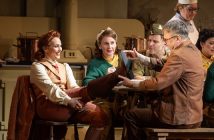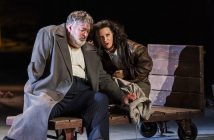‘One of the things about art,’ says singer, songwriter and multi-instrumentalist Tim O’Brien, ‘is you give people an excuse to take some time and be quiet, and pay attention to something and, maybe, under the guise of enjoyment, think about important things in life.’
‘Enjoyment’ may be the wrong word to describe the experiencing Jake Heggie’s opera Dead Man Walking, but the sentiment is bang on. That’s because Dead Man Walking gives us plenty of important things to think about; it does what great art does, simply asks a question. So often the creators of art forget that questions are all we need, and go one step further and supply the answers. That doesn’t leave space for one of the most important elements of any work of art – us, the audience. Don’t tell us how to feel; show us something and let us decide.

In the case of Dead Man Walking, the question is, could you forgive a person who brutally took someone you love from you? And the question is an unambiguous one. The choice, one of many astute choices, made by librettist Terence McNally, to show the murder clearly up front, so there’s no question of guilt, is both brave and dramatically clever. Opera moves forward. It needs dramatic momentum. Stopping every few scenes to go back for a ‘did he, didn’t he’ subplot would ruin the pace. The question we’re being asked isn’t to do with guilt – the guilt is there for all to see. It’s simply about how we, as individuals, respond to possibly the worst thing one human being can do to another.
There are obvious parallels with Britten’s Peter Grimes. There’s a person who’s done wrong, there’s an outraged society, and there’s a woman caught in the middle, desperately trying to help someone who refuses to be helped. But the stark difference is how personal Dead Man Walking makes it. It’s about how a double murder affects the families, not just of the victims but of the murderer too, as well as everyone who comes into contact with them. The question is not ‘how do we, as a society, deal with this?’ it’s ‘How would you, yes you, up there in seat E59’ deal with it?

It’s a question asked with power, eloquence, humanity and not a little beauty. Terrence McNally’s deft libretto takes us from stark, brutal drama to much needed light relief, all within a swift scene change, and the dynamic balance of the two is superbly judged. Add the that Jake Heggie’s ability to set words simply, clearly and with an obvious love of the human voice, and the music feels almost conversational at times. Given the subject matter, and the choice to give most of the characters southern accents, which could have gone horribly wrong, it’s a huge achievement.
Sister Helen, whose book of the same name the opera is based on, is a fascinating character. She is neither the victim of a crime, nor of the social justice system. We could be forgiven for wondering what she’s doing here at all. Yet she’s simply doing what she believes her god wants her to do and is torn by the situation she finds herself in. We walk every step of that path with her. Painted as a morally superior superwoman, the character would have failed. But with every ounce of fallibility and naivety she possesses on full display, particularly when she’s confronted by the father of one of the victims and asked why she didn’t think to help them, she’s a fascinating study in challenged strength and faith.

The performances are equally superb. I’ve banged on quite a bit in recent months about how good Joyce DiDonato is (here in another Heggie piece and here in Rossini’s Semiramde), but I’m going to do it again. There’s a rock solid centre to everything she does, which gives her acting as much gravitas as her vocal performance. It’s extraordinary to watch. But I was equally blown away by baritone Michael Mayes as killer Joseph De Rocher. There’s a brooding anger in his performance but also a humanity. If De Rocher appears for a second to be nothing more than a monster, the whole piece falls – Mayes judges it perfectly.
The BBC Symphony Orchestra and singers under Mark Wigglesworth are on fire too. The score is staggeringly loud and brutal in places, tender and lyrical in others and Heggie even manages to slip in a bit of Elvis pastiche at one point (and a lovely nod to Britten, whose Peter Grimes surely must have been an influence on the piece). All of this is navigated with poise, balance and all-out fury, when required.
The real question Dead Man Walking left me with was ‘why has it taken 18 years for this work to receive its UK première?’ It deserves a fully-staged run in the UK (I’m looking at you, ENO), although Leonard Foglia’s semi-staging for this performance did a remarkable job. So to the other question – is Dead Man Walking any good? Oh yes. This is powerful stuff that follows you out of the theatre and leaves you slowly, gradually over several days. I’d go and see it again in a heartbeat.
Dead Man Walking was performed at The Barbican on 20 February 2018 as part of the Barbican’s The Art of Change, which explores how the arts respond to, reflect and potentially effect change in the social and political landscape. It runs throughout 2018. Images by Mark Allan.




